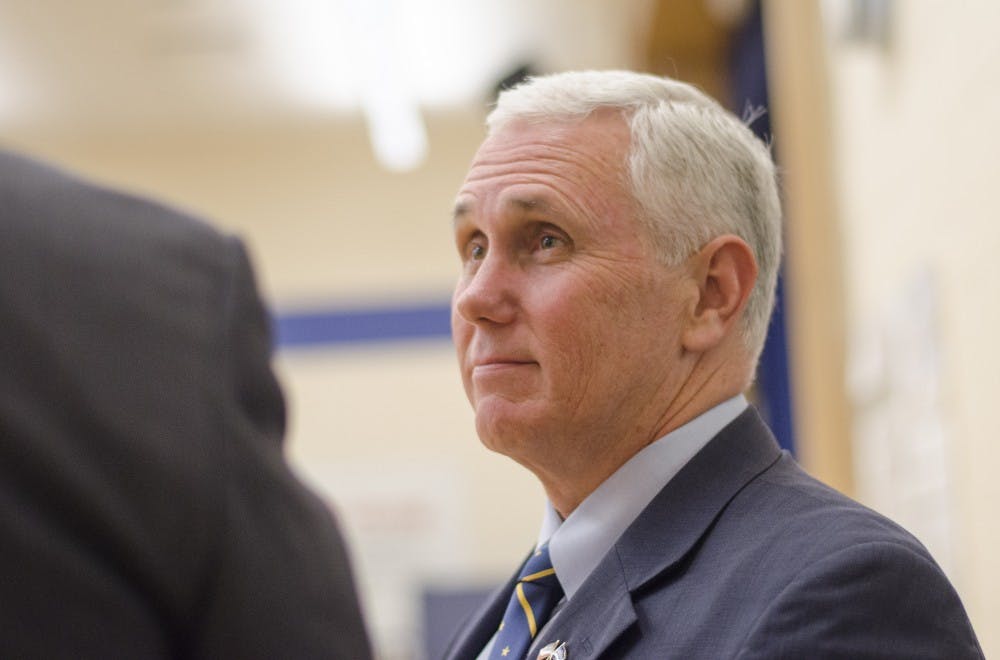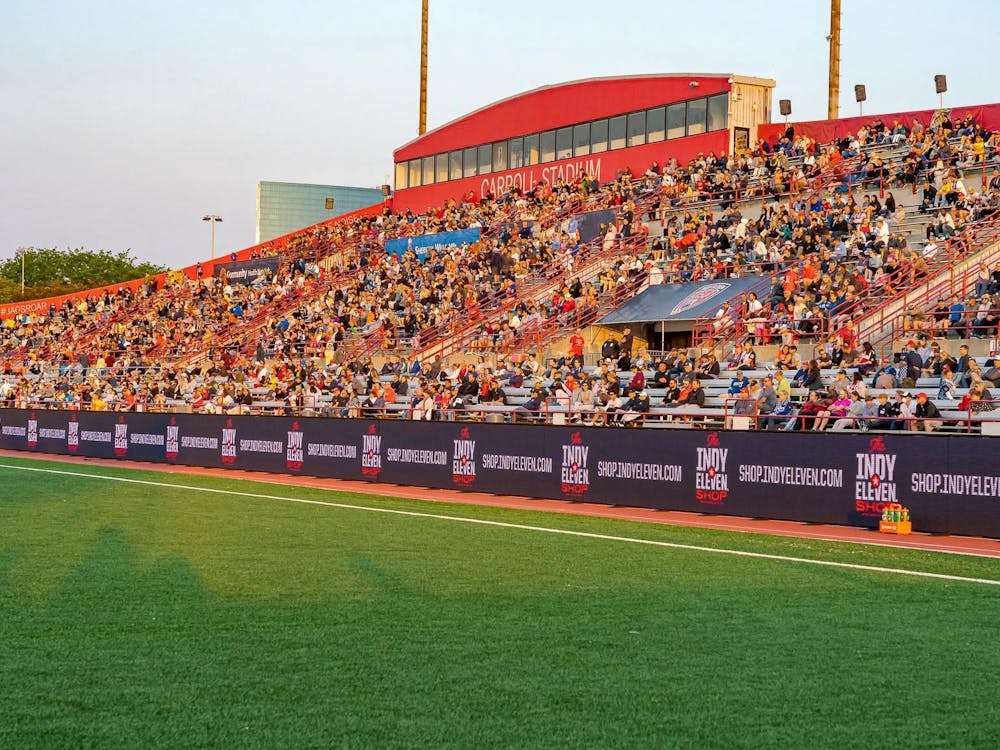Gov. Mike Pence, seeking reelection after a controversial first term, has history on his side; Incumbent governors get reelected 72 percent of the time in America, according to the Center on the American Governor.
In Indiana, no elected Republican governor has failed to win a second term.
But the governor’s plans could be derailed by a force even more potent than his Democratic foes: a raft of headlines portraying Pence as out of step on social issues and hostile to women.
“We've got the governor's race as a toss-up,” said Brian Howey, creator of the nonpartisan Howey Politics and a Statehouse media veteran.
Former House Speaker John Gregg, who will be on the ballot alongside Pence May 3 as the Democratic governor nominee, narrowly lost to Pence four years ago. This time, he has attracted little public attention until recently, choosing to let the media spotlight stay on his adversary.
“When he was running in 2012, there was no record of an incumbent,” said Robin Winston, an Indiana political strategist. “This time, [Gregg] will be running on a record of whether or not the present governor has stayed in touch with people on kitchen table issues.”
Pence’s approval rating has dropped significantly since he took office in 2012. According to the 2015 WISH-TV/Ball State Hoosier Survey, Pence’s approval rating was at 47 percent in November, 15 percentage points lower than the previous year.
The survey followed the passing of the Religious Freedom Restoration Act last spring, which critics argued would allow businesses to discriminate against LGBT people. Pence’s decision to sign the bill was met with backlash across the country from major corporate players.
Angie’s List cancelled a $40 million expansion of the company’s headquarters in Indiana and people called for the NCAA to move the Final Four from Indiana.
The effects were felt at Ball State when the National Forensics Association temporarily decided to pull its week-long speech and debate competition from the university, which ended up bringing over 1,000 students and an estimated $1-2 million to Muncie.
The state agreed to pay $365,000 to Porter Novelli, a public relations firm, in an attempt to improve its image, but for unknown reasons, its contract ended prematurely.
Although the RFRA decision received the most attention, Pence has made a handful of other controversial decisions, including attempts to remove Democrat Glenda Ritz from her position as chairman of the Indiana State Board of Education last year.
He also recently signed one of the most restrictive abortion laws in the country that places additional requirements on women. Under the new law, a woman can’t seek an abortion solely because of sex, disability or race. Pro-abortion rights advocates and even some anti-abortion rights advocates criticized the bill as being unfair.
Gregg said in an interview this month that his opponent's actions have given him an advantage.
“The last time I ran, I was running against the legacy of Gov. Mitch Daniels,” Gregg said. “This time, I’m running against Mike Pence and his record, and it is a record that he cannot defend or get re-elected on.”
A recent WTHR/Howey Politics Indiana Poll showed a four percentage point gap between Gregg and Pence in favor of Pence.
In 2012, Pence won the election by only 3 percent, a gap Gregg is confident he can close.
This was following Republican Gov. Mitch Daniels’ term, who The Washington Post reported was the third most popular governor in 2012. Daniels’ success could have helped propel Pence to the Statehouse.
Gregg is hoping to get those moderate voters he said voted for Daniels in 2008. He said his approach will be different than Pence, because he won’t focus on social issues.
“I felt like we were very down a road of dealing with social issues, and by social issues I mean dealing with who is sleeping with who, trying to restrict women’s rights and dealing with these issues that don’t employ people,” Gregg said. “It doesn’t help us attract and keep millennials. It doesn’t help us grow our economy.”
In the past, Gregg has been known as a more socially conservative Democrat, calling himself a “gun-totin,’ Bible-quotin’ Southern Indiana Democrat.”
He opposed the recent restrictions on abortion; however, he pointed out that he’s “personally pro-life.”
Pence and Gregg have similar backgrounds: both from Southern Indiana, both lawyers, both former talk show hosts and both to the right of their party on the political spectrum.
For some leftists, he might be the lesser of two evils.
While Gregg and Winston think Gregg has a good chance of winning, Howey is more skeptical.
“John Gregg is going to have to run pretty much an almost perfect campaign, and he's got to hope to take advantage of any mistakes in the Pence campaign,” Howey said.
Asked to comment, the governor’s campaign initially scheduled an interview with Pence but later declined to make him available by press time.
Although Gregg and Pence don’t have to worry about competing against anyone for Indiana’s May 3 primary, the outcome of the Indiana primaries matters — solely due to the outcome of the presidential primaries and the impact it could have on how voters view either party.
Currently, Donald Trump leads the trio of Republican presidential candidates, despite his low voter approval rating. A March Gallup Poll found that more people — 70 percent of women and 58 percent of men — view Trump unfavorably than any other presidential candidate.
Trump has also polled lower than Democratic presidential candidate Hillary Clinton in every Real Clear Politics poll since campaigning started in July. Currently, they are separated by 8.5 percentage points.
Republican leaders are trying to push Trump out of the race, which Winston pointed out rarely, if ever, happens during a presidential primary season.
The risk for Pence is if Trump is chosen as the presidential nominee, it could turn off Republican voters all the way down the ballot.
On April 29, Pence endorsed Republican candidate Ted Cruz. However, he said he would support any Republican in the fall, including Trump.
“Whoever wins the Republican nomination for president of the United States, I’m going to work my heart out to get elected this fall. Indiana needs a partner in the White House (for) our prosperity,” he said in a live interview on WIBC-FM
Howey mentioned two other times when the presidential nominee ended up being unpopular within the party: The election of 1964 with Republican Barry Goldwater and 1972 with Democrat George McGovern.
“We've seen two instances in history … where the presidential nominee became so toxic that they really pulled down the rest of the ticket,” Howey said. “I think the Republicans have a huge problem here, and Gov. Pence will have a hard time defeating that.”
Still, Gregg hasn’t done much campaigning, focusing on his own political beliefs and values. He has counted on Pence to make polarizing decisions, and then responded with critiques using press releases.
While this isn’t a problem now, Howey said it could be if Gregg doesn’t start campaigning more soon.
His focus thus far has been on raising money. Howey said during the last campaign cycle, many people thought Gregg lost the race because he hadn’t raised enough. Last election cycle, he raised approximately $6.5 million, less than half of what Pence raised.
So far, he’s raised around $3.8 million for the 2016 election compared to Pence’s $10.4 million, according to records on Follow the Money, the National Institute on Money in State Politics’ nonpartisan information service. This year, Gregg has outraised Pence, according to the Associated Press.
What time Gregg isn’t spending out on the campaign trail is probably spent on the phone, Winston said.
“It takes a lot of money to run,” he said. “If you don't [spend money on ads], then people say they haven't heard of you, they haven't heard much about their campaign, haven't seen anything about it. So it's a double-edged sword, but then if you raise too much, people criticize you for raising money from people who have the ability to give.”
Winston also said Gregg will probably hit the ground running in June after the Democratic National Convention.
While Gregg has a good shot at being competitive, Howey pointed out he can’t win just based on Pence’s reputation.
“I don't think he can win the election by saying, ‘He's Mike Pence and I'm not,’” Howey said. “He's got to show Hoosier voters why he would be a better governor, and right now, he hasn't done that.”





